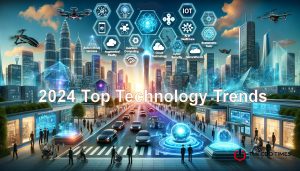Introduction
How Technology is Shaping the Modern World in 2024.In 2024, the world continues to undergo rapid technological advancements that are reshaping industries, economies, and societies. From groundbreaking innovations in artificial intelligence (AI) to the expansion of smart cities, technology is at the forefront of almost every aspect of our daily lives. As we navigate this new era, it is essential to understand how technology is impacting various sectors and transforming the modern world. How Technology is Shaping the Modern World in 2024.
1. The Rise of Artificial Intelligence (AI) and Automation
Artificial Intelligence has come a long way in the past few years, and its influence is stronger than ever. In 2024, AI is no longer just a futuristic concept, but a powerful tool that is revolutionizing industries such as healthcare, finance, manufacturing, and entertainment. With AI applications becoming more sophisticated, businesses are increasingly relying on AI-driven solutions to optimize operations, improve decision-making, and enhance customer experiences. How Technology is Shaping the Modern World in 2024.
AI in Healthcare: Improving Diagnostics and Treatment
In the healthcare industry, AI is transforming the way diseases are diagnosed and treated. Machine learning algorithms are now being used to analyze medical data, such as radiology images and patient histories, to detect conditions like cancer, heart disease, and neurological disorders. These AI systems can identify patterns that human doctors may miss, leading to earlier diagnoses and more accurate treatment plans. In 2024, AI will continue to drive innovation in personalized medicine, predicting outcomes, and streamlining patient care.
AI in Automation: Revolutionizing Workplaces
The use of AI and automation in workplaces is growing rapidly. Robots and AI-powered systems are taking over repetitive tasks in industries such as manufacturing, logistics, and retail. This not only improves efficiency but also frees up human workers to focus on more complex and creative tasks. As a result, the future of work is being redefined, with many industries experiencing a shift towards more value-added roles, while manual labor is increasingly being replaced by automated systems.
2. The Power of 5G Connectivity
5G technology is set to revolutionize the way we connect, communicate, and interact with devices. In 2024, the rollout of 5G networks worldwide is allowing for faster, more reliable internet connections with significantly reduced latency. This enhanced connectivity is enabling a wide range of new possibilities, especially in fields like Internet of Things (IoT), augmented reality (AR), virtual reality (VR), and autonomous vehicles.
5G and IoT: Creating a Connected World
5G networks will power the Internet of Things (IoT), where everyday devices are connected to the internet, sharing data in real time. With faster speeds and lower latency, 5G will enable smarter homes, cities, and industries. Smart devices like refrigerators, security systems, and wearable tech will communicate seamlessly, creating a more interconnected and efficient world.
5G and Autonomous Vehicles: A Game Changer for Transportation
In 2024, 5G will play a key role in the development of autonomous vehicles. The low latency and high-speed capabilities of 5G networks are essential for the real-time communication needed between vehicles, infrastructure, and traffic systems. With 5G, self-driving cars will be able to make split-second decisions, enhancing safety and efficiency on the roads. This advancement will likely accelerate the adoption of autonomous vehicles in cities around the world.
3. Blockchain Technology: Transforming Trust and Security
Blockchain technology, originally popularized by cryptocurrencies like Bitcoin, is finding broader applications across various industries in 2024. By providing a secure and transparent way to store and transfer data, blockchain is transforming how businesses and individuals interact with one another, particularly in sectors like finance, supply chain management, and digital identity verification.
Blockchain in Finance: Revolutionizing Payments and Security
In the financial world, blockchain is being used to enhance the security and efficiency of transactions. Blockchain’s decentralized and immutable nature makes it highly resistant to fraud and hacking, offering a safer alternative to traditional banking systems. In 2024, we can expect blockchain to play an increasingly prominent role in cross-border payments, smart contracts, and decentralized finance (DeFi) platforms.
Blockchain in Supply Chains: Ensuring Transparency and Efficiency
Blockchain’s ability to provide a transparent and tamper-proof ledger is also making waves in supply chain management. In 2024, more companies will adopt blockchain technology to track goods from production to delivery, ensuring transparency and reducing the risk of fraud. This technology is particularly valuable in industries like pharmaceuticals, where the authenticity and safety of products are paramount.
4. Quantum Computing: Unlocking New Possibilities
Quantum computing is poised to disrupt industries by solving complex problems that classical computers cannot. While still in its early stages, quantum computing has already shown potential in areas like cryptography, drug discovery, and climate modeling. In 2024, quantum computing will continue to evolve, unlocking new possibilities in research, problem-solving, and technological advancements.
Quantum Computing and Cryptography: Securing the Future
One of the most exciting prospects of quantum computing is its potential to break existing encryption methods. As a result, there is a global race to develop quantum-resistant cryptography. In 2024, we can expect advancements in encryption techniques that are immune to quantum computing attacks, ensuring the security of sensitive data in a world where quantum computing is more prevalent.
Quantum Computing in Drug Discovery and AI: Accelerating Breakthroughs
Quantum computers have the ability to simulate molecular structures and complex chemical reactions with incredible precision. In 2024, researchers will increasingly use quantum computing to discover new drugs, create advanced materials, and optimize processes in fields like energy production and environmental sustainability. Quantum computing will be a catalyst for accelerating breakthroughs that were once unimaginable.
5. Sustainability and Green Technology
As environmental concerns continue to rise, technology is playing a crucial role in creating sustainable solutions. In 2024, green technology is becoming increasingly important, helping reduce carbon emissions, conserve resources, and promote renewable energy.
Renewable Energy: Advancements in Clean Power
Technological advancements in solar, wind, and geothermal energy are making renewable energy sources more efficient and cost-effective. In 2024, we will see continued progress in energy storage technologies, allowing for more effective use of renewable energy. Innovations such as smart grids and distributed energy systems will help optimize energy use, reducing reliance on fossil fuels and advancing the transition to a sustainable energy future.
Sustainable Agriculture and Smart Farming
In agriculture, technology is enabling more sustainable practices. Smart farming techniques, such as precision agriculture, are helping farmers optimize their use of resources, reduce waste, and increase crop yields. In 2024, innovations in drones, AI, and IoT will make farming more efficient and eco-friendly, contributing to food security and environmental conservation.
6. The Metaverse: Shaping Digital Interactions
The concept of the metaverse—an interconnected virtual world where users can interact with each other and digital environments—has gained significant attention in recent years. In 2024, the metaverse is becoming more integrated into everyday life, with applications spanning from entertainment and social interaction to business and education.
The Metaverse in Business and Education
In the business world, the metaverse offers opportunities for virtual collaboration, conferences, and training. In 2024, companies will increasingly use the metaverse for remote work and team-building activities, creating immersive digital experiences. In education, virtual classrooms and training environments powered by the metaverse will become more prevalent, providing interactive and engaging learning experiences for students worldwide.
Gaming and Entertainment in the Metaverse
The gaming industry is one of the most significant drivers of the metaverse, with immersive, multiplayer experiences becoming more common. In 2024, the metaverse will continue to evolve as a platform for gaming, entertainment, and virtual social interactions. This shift will create new opportunities for content creators, developers, and marketers to engage with audiences in innovative ways.
Conclusion
Technology is transforming the modern world in 2024, shaping the way we work, live, and interact with one another. From the rise of AI and 5G to the expansion of blockchain and quantum computing, the possibilities are endless. As technology continues to evolve, its impact will only grow, creating both new opportunities and challenges that will define the future. By embracing these innovations, individuals and businesses can stay ahead of the curve and thrive in an increasingly digital world.


